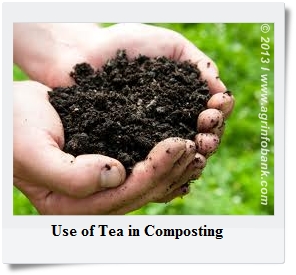Agriculture

- Beginner?s Guide To Making Compost: Organic Gardening
By: Willi Evans Galloway Nature creates compost all the time without human intervention. But gardeners can step in and speed up the composting process by creating the optimal conditions for decomposition: Air + Water + Carbon + Nitrogen = Compost Air....
- Pesticides And Vegetable Disease Control
Fungicides can be a great help in preventing diseases when properly applied to the plant foliage. Since fungicides are preventive, they should be applied before the disease occurs, or as soon as the first symptoms of disease appear. Some vegetable diseases...
- Vermicomposting: A Way To Recycle Food Waste
Asad Manzoor* Department of Agriculture & Agribusiness Management, University of Karachi. Millions of tons of food waste are buried or burned every year at significant and considerable financial and environmental cost. Instead of dumping and wasting...
- Fact Sheet: Compost Tea
When my parents emigrated to the U.S. from Iran, they brought their Persian culture along with them. Part of that involved drinking black tea at least 5 times a day. 30 years later, that tradition is still going strong, and I don't even want to know...
- Tea Used In Gardening
There is some question about the allelopathic effects of caffeine (and maybe other chemicals) in brewed tea and coffee. Better, perhaps, to drink the tea and use the spent tea leaves on your plants. Give roses a boostSprinkle new or used tea leaves...
Agriculture
Compost Tea Basics

Compost Tea is a nutritionally rich, well-balanced, organic plant food made by steeping aged compost in water. The water is then diluted and used as a root and/or foliar feed. It is also noted for its ability to control various plant diseases (blights, molds, wilts, etc. when used as a foliar spray), to repel and control insect pests and their damage when used on a regular basis, and to encourage the growth of benefical soil bacteria which results in healthier, more stress-tolerant plants.
There are several different recipes for compost tea but the basic one most often recommended here calls for the following:
1 large container with lid (plastic trash can works well)
Enough aged, completed compost to fill an old pillow case 1/2-3/4 full
Sufficient water to fill the container
Fill the container with the water. Place the compost into an old pillowcase (cheese cloth bag or pantyhose also work well), tie off the top and submerge in the container of water. Cover (to prevent odor and insect problems) and let steep for a MINIMUM of 2 weeks.
This steeping time is crucial to the formation of benefical bacteria and the required fermentation process.
When finished, dip out the "tea" and dilute it to the color of weak iced tea (3 parts water to 1 part tea) and use as root food for any and all plants on a weekly or as-needed basis.
To use as a foliar spray or on young seedlings, most recommend additional dilution. The remaining tea can continue to steep until needed.
The following factors will determine the quality of the finished tea:
Use well-aged, finished compost - Fresh compost can burn the plants or contain harmful pathogens and that which is too old is nutritionally deficient.
The contents of the compost - It should be balanced and of good quality if using purchased compost. That which contains some portion of aged animal manure apparently remains active longer than that composed only of plant matter but it isn't required.
(It is important to note that COMPOST TEA AND MANURE TEA ARE NOT THE SAME THING. Manure teas can be made in the same way but are not generally recommended as foliar sprays and are not as nutritionally well-balanced.)
Method of application and weather - A pump sprayer or misting bottle works better than hose-end sprayers for large areas or for foliar feeding as they don't plug up as easily. Re-application after rain is necessary and one should avoid applying to the leaves during the heat of the day. Root feeding is not affected by the weather.
Source of Article: http://www.gardenweb.com/
- Beginner?s Guide To Making Compost: Organic Gardening
By: Willi Evans Galloway Nature creates compost all the time without human intervention. But gardeners can step in and speed up the composting process by creating the optimal conditions for decomposition: Air + Water + Carbon + Nitrogen = Compost Air....
- Pesticides And Vegetable Disease Control
Fungicides can be a great help in preventing diseases when properly applied to the plant foliage. Since fungicides are preventive, they should be applied before the disease occurs, or as soon as the first symptoms of disease appear. Some vegetable diseases...
- Vermicomposting: A Way To Recycle Food Waste
Asad Manzoor* Department of Agriculture & Agribusiness Management, University of Karachi. Millions of tons of food waste are buried or burned every year at significant and considerable financial and environmental cost. Instead of dumping and wasting...
- Fact Sheet: Compost Tea
When my parents emigrated to the U.S. from Iran, they brought their Persian culture along with them. Part of that involved drinking black tea at least 5 times a day. 30 years later, that tradition is still going strong, and I don't even want to know...
- Tea Used In Gardening
There is some question about the allelopathic effects of caffeine (and maybe other chemicals) in brewed tea and coffee. Better, perhaps, to drink the tea and use the spent tea leaves on your plants. Give roses a boostSprinkle new or used tea leaves...
